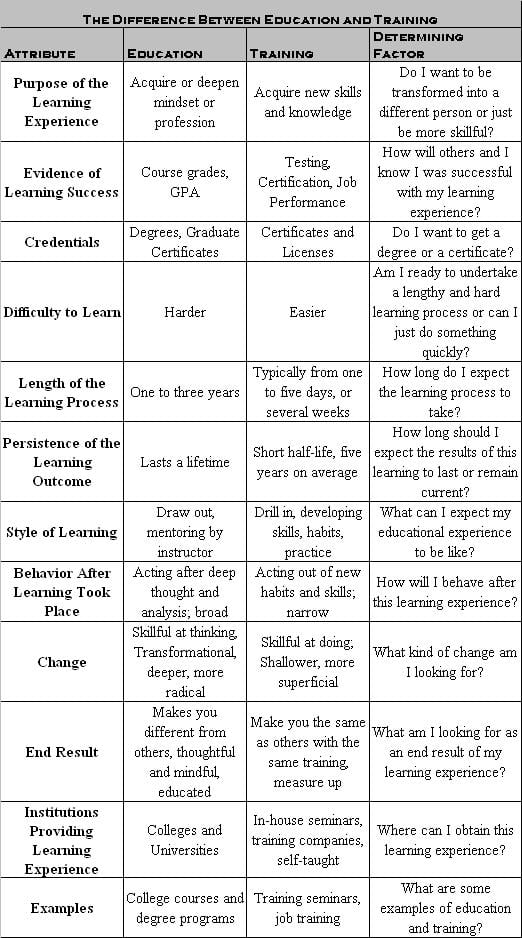Published on
Education versus Training: Selecting the Right Lifelong Learning Experience

What is lifelong learning and how to keep one’s skills updated? What is the difference between education and training? Which is important to obtain at which point one one’s career?
Once a professional has received the basic education and training of a bachelor’s degree and begins a career path in the world of work, the knowledge acquired begins to lose currency. To keep up and to advance it is imperative that professionals engage in some form of continuing education or they will soon find themselves less in demand. The question becomes: When to acquire more skills and knowledge and how? To keep advancing in one’s career, even to keep up with one’s job these days it is imperative to keep skills and knowledge current so more learning needs to take place. If the professional does not make plans and follow through on additional education, his skills and knowledge soon become out of date. The main issue in pursuing “continuing education” (and the quotes marks are necessary as it will soon become apparent) is the form of the learning experience: should it be in the form of training using short courses and seminars or should it be via more education in the form of graduate degree programs?
The answer to that question is: both are needed. The answer depends on the circumstances and the purposes for the additional learning. The main issue is deciding whether education is appropriate or if training is more indicated, and the difference between the two. The bottom line is to seek training to acquire skills and knowledge for short-term advantage. Training brings the learner up to the level of others in the industry and will tend to make them the same as the experts they seek to emulate. For example, to get a better job as a network administrator learn how to install routers and become certified in internetworking technology. Training helps the learner solve known problems with a high degree of expertise.
Education is different. It should be used to acquire a mindset not currently owned or to deepen a mindset already possessed. An electrical engineer may wish to become a businessperson and will undertake an MBA education to acquire a business and management mindset, for example. A biochemist will go on engage in a Master’s in chemistry to deepen the mindset of a professional chemist learned as an undergraduate. Education broadens the learner, makes him different from everyone else and helps him think in his own way to solve problems that have not been solved before. Of course educational programs include training in the skills and knowledge of the discipline, but they go further to develop thinking abilities, attitudes and behavior patterns that might be classified as a mindset. In this sense, training programs do not include education but education programs often include training.
How to decide whether to engage in training or in education? And how to know which is needed, if maybe not both? There are several attributes of education and training that can help answer each question. The table (Based on Arthur Chickering’s work in Education and Identity, Jossie-Bass, 1993) summarizes the attributes of education and training and poses the critical questions the learner must answer when choosing between them.
Case Study
Nilesh works in the IT department of a large consumer product company. He has a computer science bachelor’s degree and has been working as a Java programmer for the last two years after he graduated from college. He wonders what’s next for him? Should he continue to perfect his programming prowess or consider making a change? He has decided to develop additional expertise in cyber security since he enjoys that work and wishes to develop his technical prowess further. He decides that since he does not have a Master’s degree, an additional credential would prove beneficial. But should he do some short-term training in cyber security and be certified or undertake a longer educational process and enroll in a Master’s degree? The answer is probably a balance of both.
Studying for a Master’s degree part-time while working full time is very popular and profitable. Using company educational benefits to pay for tuition is an excellent way to leverage his employment. He decides to enroll in a top ranked Master’s program in computer science degree with a cyber security concentration. He knows that thereby he will acquire the mind set of a cyber security expert, as well as have the recognized professional credential that will last him throughout is lifetime. At he same time he decides to take advantage of training opportunities through his company to attend several week long training seminars with a well known and reputable training company in cyber security subjects. There he picks up valuable skills in setting up firewalls and programming security features into applications. His aspiration is to study and take the CISSP certification exam and be CISSP certified. Together with the Master’s degree, the CISSP certification would place him in a very competitive position for employment in the information assurance industry.
Author Perspective: Administrator




